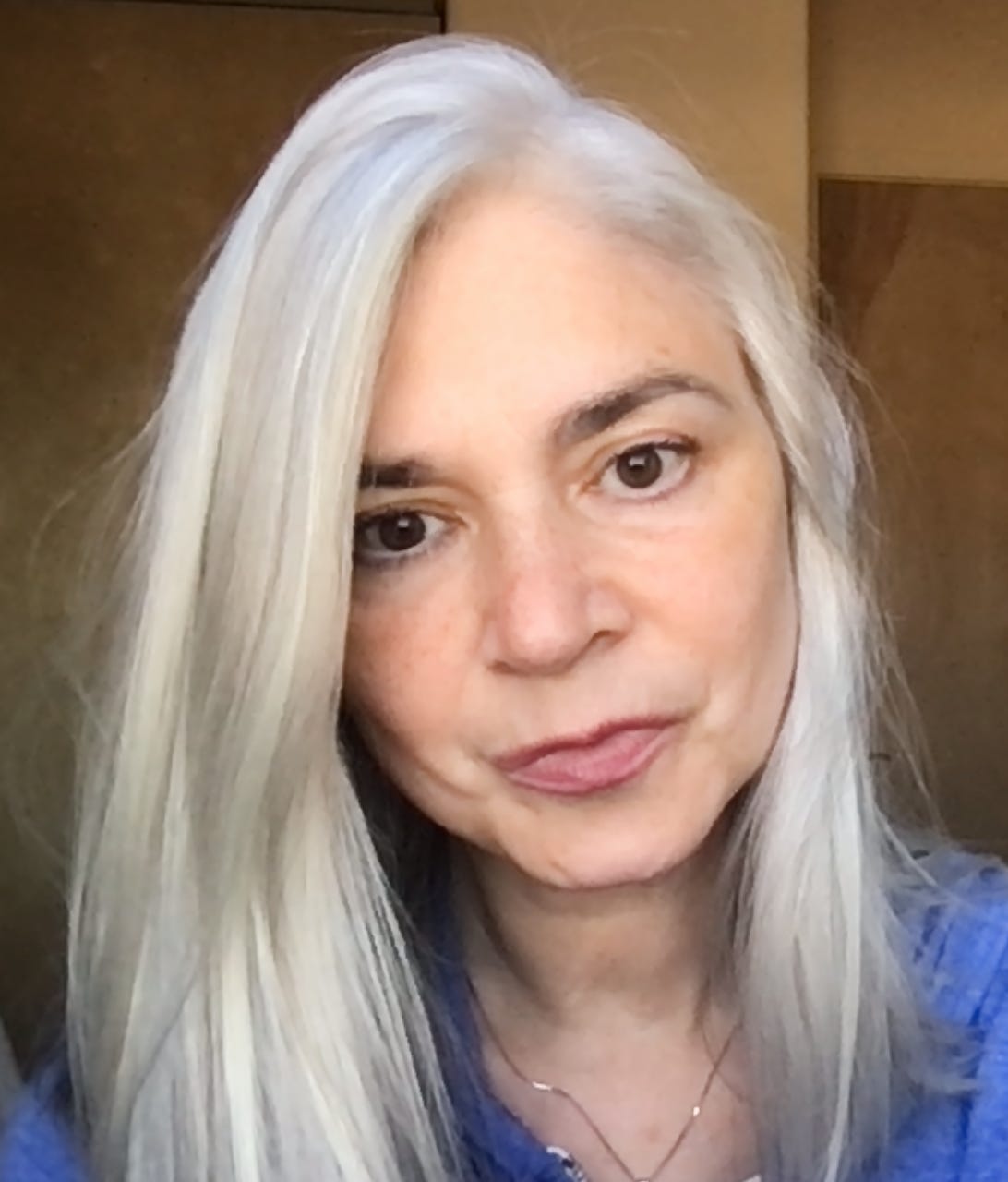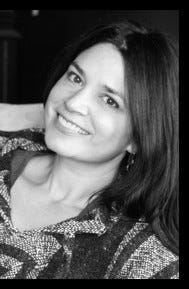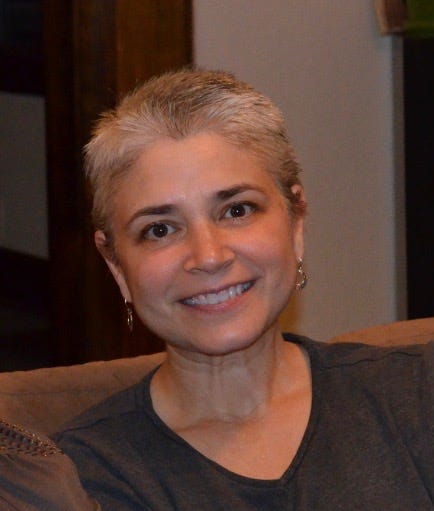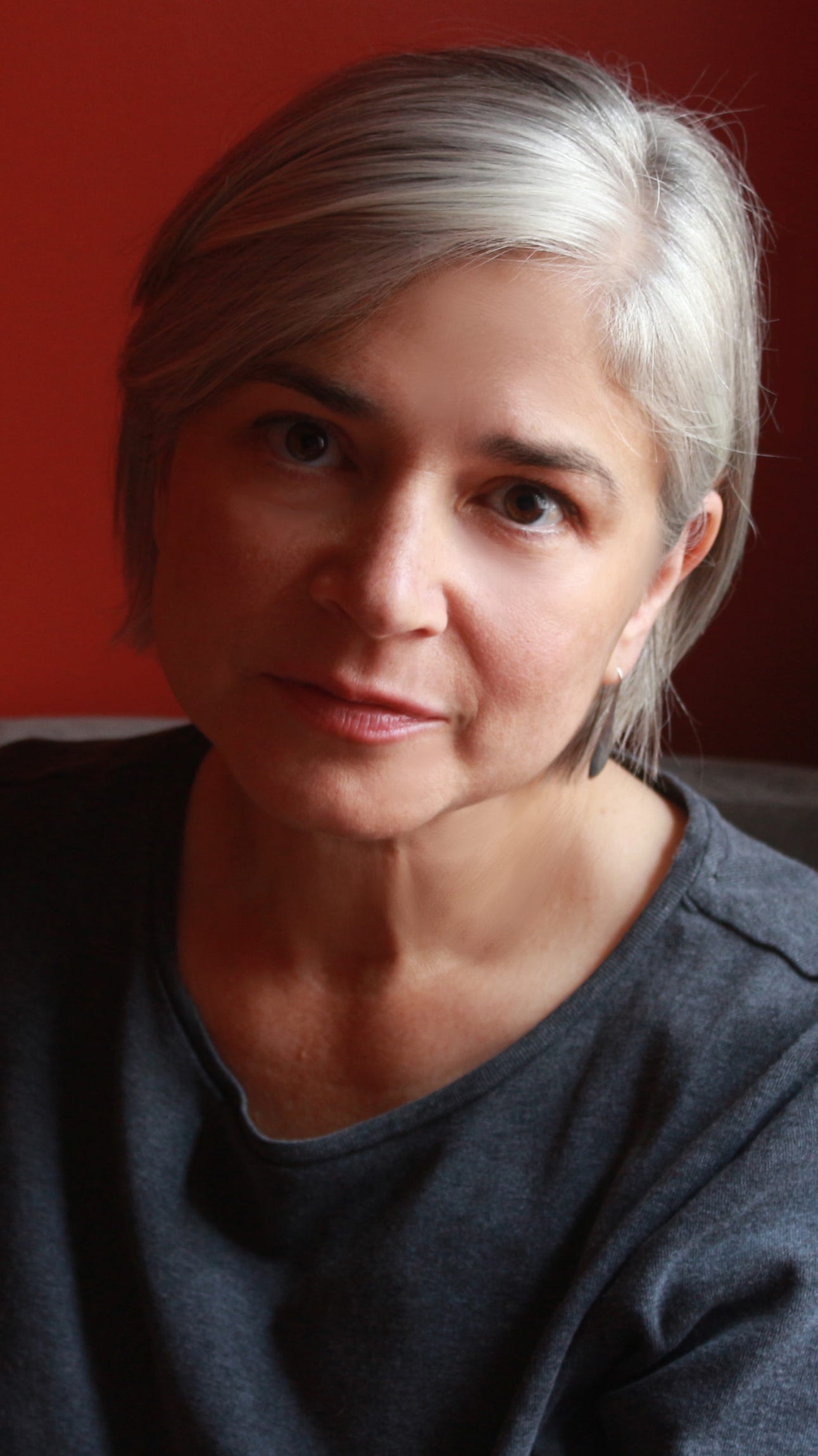Burning it Down
After shearing off her dyed hair and growing it out silver, Joy Castro considers the thrill and terror that come with setting oneself free.
“A woman who cuts her hair is about to change her life,” said Coco Chanel, who knew.
In 2014, at the age of 46, I asked my hairstylist to take her clippers to my long dark mane, leaving only an eighth of an inch of silver roots next to my scalp.
My stylist was bewildered; she’d been cutting and coloring my hair for years. But I’d grown tired of the cost, the time spent sitting in salon chairs, waiting for the chemicals to do their work—and guiltily tired of the chemicals rinsed into the water system each Sunday evening as I touched up my fast-growing roots at home. I’d even grown tired of the reactions of disbelief—however flattering—when my 25-year-old son and I went somewhere in public together. I was bored with looking young for my age.
In 2014, at the age of 46, I asked my hairstylist to take her clippers to my long dark mane, leaving only an eighth of an inch of silver roots next to my scalp.
As she sheared away long swathes, the stylist began to cry.
“Are you okay?” she kept saying, as if I were the one in tears.
But I was okay. I felt exhilarated—yet also eerily unmoored. Aside from a couple of flirtations with bobs—once before my son was born and again when I was trying very hard to look professional—I’d had long, dark hair all my life. Since my late twenties, when it began to go silver, I’d colored it assiduously, like all the women in my family—like all the Latinas I knew. Dark hair was a marker of identity, of youth, of femininity, of our culture.
Finally the floor around me was covered in soft darkness.
The stylist stroked the variegated silver pelt that covered my skull. “It’s like fur,” she breathed. “Like an animal’s fur.”
I stood up. We looked at me in the tall mirror. I looked like a weird heroine from a post-apocalyptic film.
“Are you sure you’re okay?”
I nodded. I really liked it.
But who was that I? The woman in the mirror looked and felt deeply strange, unpredictable. Free, yes—but like in the word freefall. Unknowable, and unknown.
Since my late twenties, when my hair began to go silver, I’d colored it assiduously, like all the women in my family—like all the Latinas I knew. Dark hair was a marker of identity, of youth, of femininity, of our culture.
In Borderlands/La Frontera, Gloria Anzaldúa describes Nepantla, a Nahuatl word for in-betweenness—“a space,” as she explains, “where you are not this or that but where you are changing.”
Nepantla was the state I was in, a space I’d rarely heard described.
But changing into what? And why?
Shortly after leaving my hair on the floor of the salon, I was invited to join my friend Kim, a doctor, on her medical work-trip to Haiti. A literature professor, a squeamish type by nature, I’d always averted my eyes when I got my annual flu shot or had blood drawn, so even I was surprised when I said yes.
As a child, I’d lived for some years in poverty in Appalachia, but nothing had prepared me for the suffering and immiseration at the clinic in Pierre Payen, where I worked intake with a clipboard and my nonexistent French, helping the sick and injured Haitians who stood in lines for hours, giving new meaning to the term patient. Short of staff, a physician pressed me into service as a nurse for simple surgeries.
Wearing shapeless green scrubs and with my newly mannish head, working wherever I was useful, I seemed to myself to be not a woman at all—more of a formless, inchoate thing, a sexless monk, my own transitional object.
“Scalpel,” she’d say, like on TV, and I’d hand it to her, trembling. Twelve of us slept on the floor in a room; the shower was a trickle, and the toilet we shared did not flush. With the heat index hitting a hundred and three, I stood for hours, masked and dressed head to toe in rubber (against HIV infection), heavy and sticky with sweat, at the deep sink outside the OR, scrubbing blood and small gobbets of flesh from surgical instruments, trying not to be sick.
Trying not to cry, I helped examine a quiet, kind-eyed man whose inoperable tumor was half the size of his face. I tried not to cry when a father wheeled in his teenaged son, who’d dived into a shallow creek and broken his neck. The father, who’d already lost his wife and other children to cholera, had driven for hours through the mountains. He begged the doctors to save the boy, who sat in the wheelchair, head crooked. His father’s eyes. His eyes. He died the next day. I sobbed alone in an empty room.
In the afternoons, I’d climb to the roof with a nurse on her cigarette break and stand in the wind, looking out at the green treetops and dusty ground that sloped down toward the blue Caribbean. After meals of goat and mango, I’d sit on a low wall outside the dining hall, and Haitian children would shyly approach to run their hands across my strange silver head-fur. Wearing shapeless green scrubs and with my newly mannish head, working wherever I was useful, I seemed to myself to be not a woman at all—more of a formless, inchoate thing, a sexless monk, my own transitional object.
Our time in Haiti ended. I got back stateside, to my apartment in Nebraska and pipe-borne drinkable water and kind husband. I returned to teaching and writing. Time passed.
He came home from a business trip to D.C., and when I hugged him, I meant it. But once we were inside our apartment, he set his suitcase down in the front hall and looked steadily at me.
“Do you even want to be married?” he said.
I knew what the correct answer was. We’d both been delivering it for ages, like our parts in a catechism of marital faith. For twenty-three years, we’d been together.
“No,” I said.
He left for a hotel, and I stood there alone, stunned by what had come out of my own mouth.
“Do you even want to be married?” he said…I knew what the correct answer was. We’d both been delivering it for ages, like our parts in a catechism of marital faith. For twenty-three years, we’d been together…“No,” I said.
I stayed behind in the apartment, chanting silently each day: Thank you for healing me completely. I don’t know where it came from, that mantra, or why I kept repeating it, or to whom.
Over and over, I said thank you for something that hadn’t happened yet. In desperate confusion, I kept saying thank you.
In the seven intervening years, I have walked the neighborhood in Havana where my great-great-grandmother lived in the 1860s, until, widowed by the Ten Years’ War, she left with her children for Key West. I’ve swum for hours in the peacock-hued waves of Varadero Beach. I’ve seen Stockholm, London, Salzburg, Paris, Zurich, La Paz. I’ve hiked the Bolivian Andes.
I began seeing someone new. A film scholar, he took me with him to the Berlinale, and when he encouraged me to write film criticism—a complete departure from my professional training—I did. Seeing with fresh eyes, I wrote what I saw.
A few years later, on the banks of the Rhine, as New Year’s Eve fireworks exploded above us, with two flutes of champagne and his grandmother’s ring, he proposed. We married on our friends’ deck in a very simple ceremony.
Yet what might sound like some mid-life version of happily-ever-after closure is not. I do not feel some newly settled sense of clear and comfortable identity, and I’m not sure I ever will again. Or that I want to.
Rather, a wild feeling of openness, curiosity, and formlessness attends me all the time, a haunted exhilaration, an awareness of what I’m capable of destroying.
All my life, I’ve remembered with particular clarity one scene from Lawrence Durrell’s Justine, a moment that struck me with great intensity when I read it long ago as a very young woman, far less sophisticated than its characters in Alexandria. I recall it vividly still, even now that most of the rest of the novel has blurred in my memory.
The elegant title character, engaged in an affair, sweeps all the glittering objects from her vanity and names that act as precisely analogous to what she and her lover are doing to the lives of others. She is unapologetic, unracked by guilt. She destroys, and names the destruction.
A wild feeling of openness, curiosity, and formlessness attends me all the time, a haunted exhilaration, an awareness of what I’m capable of destroying.
Why did her gesture strike me so fiercely then, scoring my imagination?
Why have I always been fascinated by Kali, the skull-draped, birth-giving goddess who destroys in order to create?
Why did I stack over sixty bound journals—notebooks I’d kept since the age of 12—on the dining table, staring at them for hours, before destroying them all and leaving with my new husband for Berlin?
There, I finished writing one novel and drafted another, based on historical fact.
In it, a revolutionary burns a city to the ground.
Women are so often tasked with being the keepers of the hearth, the nurturers of family and social bonds, the senders of thank-you notes. The ones who preserve, maintain, tend—who stoke only manageable, usable flames. The terror of freedom is not a thrill we’re taught to navigate.
During the pandemic, my silver hair grew long. It falls around my shoulders.
For now.









